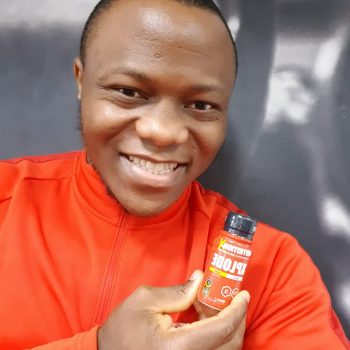With the Tokyo games upon us, we're incredibly proud to be supporting a number of Team GB athletes with a range of our scientifically-formulated supplements; not least Cyrille Tchatchet II, who will be competing in the Refugee Olympic Team in the Weightlifting event.
We caught up with Cyrille before he headed off to Tokyo to talk about his path to the Games, including how he got into weightlifting, his nutrition strategy and how he's feeling about the greatest competition of his career.
How did you first get into weightlifting?
I started weightlifting around 2010 after seeing a framed picture of my cousin’s father who was a weightlifter for Cameroon. It inspired me to get into the sport and, from there, I - like most weightlifters - developed an interest in competition over time. In Cameroon, I started competing at local level, then national, then international. I guess it develops over time!
How has it been juggling a full-time job whilst training for the Olympics?
I think I actually managed it very well. When I qualified as a nurse, I used to work on a hospital ward from 7am – 9:30pm. It was very difficult back then to juggle both which is the reason why I moved to a community team where we do 9am to 5pm, Monday to Friday. Therefore, I am able to train everyday after 5:30pm as I don’t live very far from my workplace; really helpful for ensuring I can get the training in that I need.
How has training for the Olympics changed when compared to your usual training strategy?
There isn’t a huge difference between my day-to-day training strategy and training for the Olympics and throughout the run-up to the Games I’ve maintained training between 5-6 times per week.
How do you approach nutrition to support your training?
The way I approach nutrition now is very different compared to say 6 years ago. My understanding of nutrition and how it impacts my performance has improved a lot; I aim for 1.6g protein per kg of body weight and eat a balanced diet with lots fruits and vegetables (although, I still have a sweet tooth!). I do often struggle to achieve my required protein intake through food, so most of my protein comes from supplements like Nutrition X’s Big Whey.
What is your typical day, nutrition-wise, in the run up to the Olympics?
It varies a lot, although often looks like the following:
Morning
Porridge and peanut butter + 50g protein shake
Or 2 slices of seeded bread and peanut butter (or Tuna) + 50g protein shake
Lunch
Rice, potatoes or spaghetti and chicken and vegetables
Nutrition X Repair Shot
Fruit selection; ie. Banana, apple and orange
Pre-Training
Sometimes 25g protein shake
Sometimes a pre-workout supplement
Dinner
Could be anything from chicken, fish or meat + 50g protein shake
Fruit selection; ie. Apple and orange
The amount of carbs, protein and fat depends on when my competition is and whether I need to reduce body weight. When doing this, I’ll often reduce my carbohydrate intake and increase my intake of vegetables, cutting back on sugary fruits, too.
How are you feeling about the Olympics?
I am very excited to be returning on the platform but a bit nervous too!
It will be a privilege to represent not just refugees but the 80 million displaced people around the world. As my coach always says, “everyone can represent their country if they are good enough, but not everyone can represent the refugee Olympic team.” Representing this team is a privilege and a huge responsibility; the Olympics is a dream come true and I am looking forward to it.
What are the biggest considerations for any weightlifter when it comes to training and recovery?
Focus on assimilating the right technique before lifting more weights - I cannot emphasise enough this aspect of training. I wish someone had told me this and helped me get my technique correct first when I was younger! Resilience and patience are also key if you want to make it to the top. Eat well, sleep a lot and reduce the amount of time you go out drinking… The body of a weightlifter is precious and needs to be taken care of!




